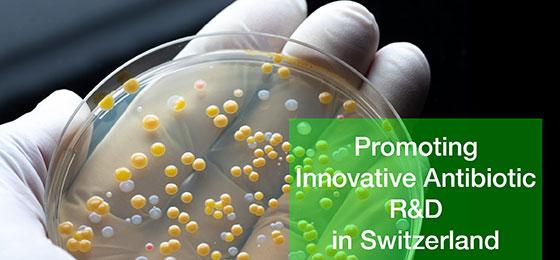Antibiotic research networking event: the market won’t correct things by itself

Research is delivering a large number of innovative approaches for new antibiotics, but only a very small number are being developed to market-readiness.
Representatives of academia, industry, government and funding initiatives discussed ways of changing this at the networking event "Promoting Innovative Antibiotic R&D in Switzerland" held on 24 June.
NRP 72 and the National Centre of Competence in Research NCCR AntiResist were the joint organisers of the online event, which attracted just under 100 participants. The day was chaired by NRP Steering Committee member Malcolm Page, who is very well acquainted with all aspects of both academic and industrial antibiotics research.
The event kicked off with a political perspective on the issue from Council of States Member Maya Graf. She was followed by Michael Altorfer, CEO of the Swiss Biotech Association, who showed that market mechanisms have failed to exert any influence on the development of new antibiotics for years. The prices of available antibiotics are very low, and sales of new antibiotics are kept as low as possible since they are primarily intended as reserve antibiotics for when existing treatments fail.
In the light of this, various speakers reflected on ways in which new incentive mechanisms could help supply the essential new antibiotics that medicine will need going forwards. Last but not least, attendees discussed the role of state players, who, in addition to funding academic basic research, need to get more heavily involved at the other end of the development process. Suitable financial reimbursement systems would enable them to reward new developments at the point where the medicines actually reach the market.
Although such approaches have been under discussion for some time without any breakthrough solutions being implemented, various funding initiatives are currently filling the gap. Other speakers discussed their activities and the options they provide. For example, Kevin Outterson, Executive Director of CARB-X Global Partnership, gave a presentation on his organisation, which funds antibiotics projects by small and medium-sized pharmaceutical companies worldwide, drawing primarily on financing obtained in the USA. Seamus O'Brien, R&D Director at the Global Antibiotic Research and Development Partnership (GARDP), explained how the international non-profit organisation funds promising approaches to new antibiotics at all levels. And Thomas Cueni, Director General of the International Federation of Pharmaceutical Manufacturers & Associations (IFPMA) explained how big pharmaceutical companies have set up a billion-dollar fund to finance selected projects by smaller companies.
Finally, several speakers focused on research in the narrower sense, demonstrating the large number of approaches that high-level research is delivering. While NRP 72 and NCCR AntiResist are particularly noteworthy in the academic context, representatives of several Swiss companies also presented and discussed their antibiotic research activities, including Glenn Dale of BioVersys, Daniel Obrecht from Polyphor, Myria Biosciences' Irene Wüthrich, Laurenz Kellenberger of Basilea and Ken Bradley from Roche.
These presentations clearly illustrated the leadership in antibiotics research that Switzerland's academic institutions and pharmaceutical industry enjoy. At the same time, however, it was apparent that greater dialogue between both sides would increase the chances of new developments emerging. One vehicle for dialogue already exists in the form of biotechnet's Antibiotics Platform, which was the subject of a presentation by platform leader Markus Seeger. There was extensive agreement that the major potential can only be exploited if government makes a greater commitment to this area. In this respect, the event provided important impetus that now needs to filter down to the government and public to a greater extent.
